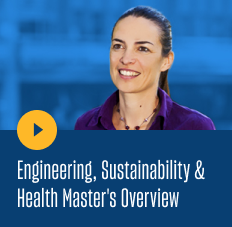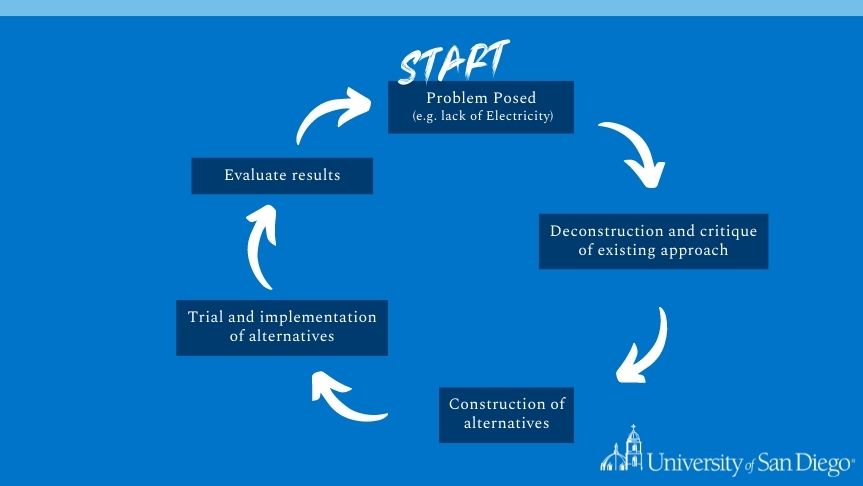Nothing can continue unless it is sustainable, and there’s an increasing acknowledgement by world governments and the private sector that our current “business as usual” approach cannot continue. The existential threat that is climate change hangs over us all with recent dire predictions for global heat waves, extreme drought conditions, future pandemics and other crises.
But where there are challenges, there is also opportunity. Governments are researching and investing in ways to take action in response to issues like alternative fuels, food and water shortages and natural disaster recovery. More businesses are recognizing the “triple bottom line” of people, planet and profit and are looking to start initiatives and hire positions that address environmental and social issues.
If you’re looking for ways to help solve these challenges — while also hoping to support yourself with a rewarding and stable career — then pursuing a sustainability degree or other related higher education program could be your best step forward.
What Is “Sustainability”?
The United Nations, citing a seminal 1987 report from its World Commission on Environment and Development (also known as the Brundtland Commission), defines sustainability as: “meeting the needs of the present without compromising the ability of future generations to meet their own needs.” As such, most sustainable practices are designed to support either human or environmental health in a way that supports the existing environment, communities and economies.
One of the more recent and comprehensive definitions of what sustainable practices need to consider was the identification of six “Grand Challenges of the 21st Century” by the National Academies of Engineering, Sciences and Medicine. In its 2019 joint report “Environmental Engineering for the 21st Century: Addressing Grand Challenges” the National Academies defined the following challenges that needed to be met:
- Sustainably Supply Food, Water, and Energy
- Curb Climate Change and Adapt to Its Impacts
- Design a Future Without Pollution or Waste
- Create Efficient, Healthy, Resilient Cities
- Foster Informed Decisions and Actions
- Preparing the Field to Address a New Future
To meet these interconnected global challenges — including related matters of public health, hunger, inequity, disease and other humanitarian crises — requires bold change, innovative thinking and collaboration between industries and fields of study. Unfortunately, “sustainability” as a word has tended to become overused and misused. What some people think of as sustainable practices — such as developing sustainable energy and green technologies — only seek to maintain current systems without changing them, which is no longer adequate for addressing our current and future challenges.
We, instead, consider Julian Agyeman’s notion of a ‘just’ sustainability, which he defines as “the need to ensure a better quality of life for all, now and into the future, in a just and equitable manner, whilst living within the limits of supporting ecosystems.” That acknowledgement of limits is key, as what we think of as sustainable needs to be a regenerative practice that can design and apply techniques to restore our natural systems for future generations.
This understanding of sustainability is the only way to ensure the long-term well-being of public health and human society.
What Does a Sustainability Degree Entail?
Sustainability degrees focus on more than just environmental sustainability; instead they exist at the intersection of all environmental, social/cultural and economic systems. The study of sustainability concerns the physical and life sciences, engineering, social sciences and humanities and will also consider matters of political science, public policy, business administration and many social and cultural systems.
Due to its wide breadth, sustainability is an important consideration in many key sectors and industries, and will be a topic of study for areas including:
- Environmental protection and preservation
- Animal and plant diversity
- Energy production
- Waste reduction and recycling
- Agriculture
- Manufacturing
- Transportation
- Public health
With such a wide range, there are many colleges that develop sustainability degree programs around environmental policy or green technologies. When you’re looking for a bachelor’s or master’s degree in sustainability, you’ll first need to consider your skills and interests as well as the areas that you would prefer to work in.
Are you an engineer who would prefer to work on energy production, or do you feel that clean water is a greater concern?
If you’re going into public health, are you more passionate about disease prevention and epidemiology or is health education more your calling?
You should research the program to determine if the courses are designed to focus on practices of just sustainability — or are they “regular” programs of science/business/health with sustainability coursework built into it?
There’s a lot to consider, so to help start your research, here are 15 sustainability degree programs to consider — six bachelor’s and nine master’s — plus a general overview of their area of study.
Want to Work with Other Professionals Toward Sustainable Solutions?
Learn More About the MESH Program in Our On-Demand Webinar — Watch Now
6 Types of Sustainability Bachelor’s Degrees
- BA in Environmental Science — The Bachelor of Arts in Environmental Science is an interdisciplinary major, intended to cover theories and areas of study across the humanities, physical, social and natural sciences. It is a starting point for further specialization into other sustainability majors and can lead to careers in public advocacy, law, journalism, public health and environmental conservation.
- BA in Sustainable Development — A Bachelor of Arts in Sustainable Development focuses on understanding and upholding sustainable development goals at local, regional and global levels. This degree can specialize in areas of agritourism, food systems, wildlife management, urban planning, watershed conservation and education.
- BS in Food Systems and Sustainable Agriculture — The Bachelor of Science in Food Systems and Sustainable Agriculture is specifically focused on the agricultural production, management and utilization of plants, animals and biofuels. These programs are often a direct line to careers in horticulture, animal agriculture, nutrition and public health.
- BS in Environment and Sustainability — Similar to the BA programs that study the environment and sustainability, the Bachelor of Science degree is an interdisciplinary approach to studying the natural world in tandem with economical and technological development. These programs will focus more on the physical sciences and be more geared toward careers in air quality management, renewable energy development, waste management, pollution control and environmental engineering.
- BS in Community Development — The Bachelor of Science in Community Development is a social science degree that draws upon the fields of political science, anthropology and urban studies to study the social, political, cultural and economic dynamics that shape and constrain human development. Careers that arise from studies in community development include urban planning, data analyst, environmental regulation and economic development.
- BS in Business Administration, Sustainability Management — Sustainability Management is a specific track within the Bachelor of Science in Business Administration that places the consideration and study of environmental and community responsibilities on equal footing to effective management and financial profitability. This degree fits well with those pursuing careers in entrepreneurship, business management, public relations and marketing.
9 Types of Sustainability Master’s Degrees
- MS in Sustainable Engineering — A Master of Science in Sustainable Engineering seeks to support the availability of natural resources as well as account for engineering’s influence on communities, politics and economies. This interdisciplinary approach to considering holistic, sustainable systems is a popular advanced degree for those interested in renewable energy systems, product design, engineering policy and health and safety directors.
- MS in Environmental Studies — The Master of Science in Environmental Studies is an interdisciplinary degree that brings together different areas of study, including environmental health, law, chemistry, biology and policy. As an advanced degree with a broad area of concentrations, it’s well suited for those whose careers will require a breadth of knowledge and skills, such as consultants, environmental scientists, policy analysts, educators and sustainability specialists.
- MS in Environmental Science and Monitoring — The focus of a Master of Science in Environmental Science and Monitoring is to teach the skills and tools necessary to understand, measure and analyze environmental impacts, ranging from changes at the molecular level of individual organisms up to issues that affect entire ecosystems. This degree is of great use for those interested in becoming natural resource managers, environmental consultants, research scientists and environmental project managers.
- MS in Environment and Energy Policy — A Master of Environment and Energy Policy utilizes engineering, sciences and social sciences to examine the challenges and opportunities of energy and its impact on the environment. Much of the purpose of this degree is to develop new solutions for the world’s energy needs while ensuring that policies and technologies are designed to preserve and repair the natural world. This degree is a great fit for business analysts, energy consultants, environmental scientists and directors of policy.
- MS in Architecture, Sustainable Buildings — A sustainability track for a Master of Science in Architecture program will focus on the regenerative design of buildings to sustain and regenerate food, water and energy use within local ecosystems. As a multidisciplinary approach to architectural study and design, this degree is a good choice for aspiring architects, urban planners, landscapers, engineers and sustainability design specialists.
- Master of Public Health, Environmental Health Focus — With a concentration/focus on environmental health, the Master of Public Health degree examines human health and its relation to the health of the environment. On a broad perspective this can include a focus on work safety, infectious disease, climate change, toxins and pollutants, air quality and general living conditions. Relevant careers for graduates of this degree include environmental health engineer, research technician, health and safety specialist and data analyst.
- MBA in Sustainable Enterprise — Alternatively called an MBA in Sustainable Innovation or Sustainable Business, the Master of Business Administration in Sustainable Enterprise places matters of sustainability — such as environmental justice, climate change and social responsibility — at the forefront of doing business. This MBA concentration is a great fit for future entrepreneurs or for anyone interested in positions such as sustainability consultant, director of compliance, environmental operations lead or chief sustainability officer.
- MBA in Energy and Environmental Focus — Energy and Environmental Focus (or sometimes referred to as an MBA in Sustainability) is a Master of Business Administration concentration that examines the business and economics of energy and its impact on environmental policies and social systems. Graduates of this program not only make great entrepreneurs, but also are good fits for positions in business management, energy trading, construction management and renewable energy projects.
- MS in Engineering, Sustainability and Health — The Master of Science in Engineering, Sustainability and Health (MESH) is a transdisciplinary degree that brings a consideration of technology, engineering and health fields within a focused learning environment to solve complex challenges relating to health, human and environmental development, peace and justice. MESH graduates are well positioned for leadership and managerial roles across all types of corporate, nonprofit and non-governmental organization professions as well as careers as entrepreneurs or consultants.
5 Reasons to Get a Sustainability Degree
If you’re unsure about whether to pursue a bachelor’s or master’s degree in sustainability, or to enroll in a program that has a focus or concentration in sustainability / environmental development / green technology — then consider the following:
- It’s a fast-growing job sector — “Green” jobs postings have continually increased 8% annually over the past five years as organizations realize the importance of sustainable development. The International Labor Organization estimates that there could be 24 million “green economy” jobs worldwide by 2030.
- It’s a way to differentiate yourself — As more countries tighten restrictions on waste, consumption and energy use, more companies are looking for employees who are skilled with the development and implementation of environmental initiatives. Showcasing the experience and expertise you’ve earned from a sustainability degree can set you apart from other job candidates.
- It’s another way to enhance your skill set — Beyond attaining knowledge, addressing any of the complex issues related to the Grand Challenges of the 21st Century require the development of strategic skills like critical thinking, effective communication and project management. This is especially true when participating in a project-based degree programs like MESH.
- It will help you make a difference — Outside of personal life choices or coordinating workplace initiatives, it can feel difficult to effect real change for these global issues. Being part of a sustainability program and then establishing a career focused on matters of just sustainability can empower you to have a positive impact on the most vulnerable areas of society and the environment.
- It’s fulfilling — Part of a life worth living is finding meaning in the work that you do. You can take pride in knowing that you’re helping realize a more sustainable, just and equitable world for future generations.
Popular Careers in Just Sustainability and Regenerative Practices
There are many different career paths that either are dedicated toward realizing sustainable practices or must consider sustainability as part of their work. The most common and popular careers include:
Careers directly positioned around sustainability:
Careers that incorporate sustainability concerns:
If you’re interested in a more-indepth look at careers in sustainability — and the type of companies that are hiring — then read our blog post on The Top 12 Sustainability Careers.
Sustainability Career Advice from Our Experts
To truly work toward “just sustainability” keep the following advice in mind.
- Start by questioning what we are sustaining — and for whom? To avoid simple “greenwashing” and acts of mere performative sustainability you’ll need to develop your complex systems thinking and critical analytical abilities. Just building on what we already have isn’t enough; true innovation is necessary for fostering positive change on our planet.
- For the well-being of our planet, as well as for our own survival, all interventions that impact the environment must be more than sustainable — they need to be regenerative. Regenerative practices go beyond maintaining systems, they recognize how natural systems are currently impacted and design and apply techniques to restore them to improved productivity.
- Don’t be a generalist in your approach; instead make an effort to focus on solving specific problems that occur in real contexts. This requires that you escape a “business-as-usual” mindset by building your competence, confidence and credibility in sustainability studies. To be truly effective, Net Impact recommends earning a higher-level degree to further your skills, knowledge and experience.
- Finally, if you’re looking for the best sustainability master’s and bachelor’s programs, search for programs that integrate hands-on experience and practical work with academic knowledge and theory.
What to Consider When Looking for a Sustainability Degree Program
Start by looking for programs that are tied to the school’s commitment to just sustainability — those goals and ideals should be a core part of the program’s identity. That way you can ensure that it’s not just paying lip service to the notion of sustainability.
You’ll also want to prioritize programs that ask you to put theory into practice. Beyond just learning theories or examining case studies, you’ll want to invest in a program that enables (and challenges) you to put in work and have something to show along with your degree.
The best way to move forward with support is to work with like-minded people who are as committed as you are. You’ll want to work with a faculty that has experience in areas related to sustainability, environmental impact and social justice. You’ll also want the ability to learn from and work with other transdisciplinary disciplines for new approaches to big problems.
The University of San Diego’s Master of Science in Engineering for Sustainability and Health program aims directly at the kind of professional development today’s professionals need to solve the National Academies’ grand challenges of tomorrow.
In MESH we are bringing together the wisdom of ecologists, sociologists and experts in just transitions with engineering and public health to consider what is possible to ‘sustain’ in the long term for environmental and human health. Our goal is to ensure that progress and innovations are shared equitably with all communities.
If you’re interested in learning more about the MESH degree program, contact us for more information.
Hear More About the Transdisciplinary Vision Behind the MESH Program in Our
Free On-Demand Webinar — Watch Now
Sustainability Degree and Career FAQs
Resources for Sustainability Industry Professionals
- American Society of Civil Engineers — Sustainability
- The Association for the Advancement of Sustainability in Higher Education
- Green Jobs Network
- Idealist
- National Registry of Environment Professionals
- Net Impact
- Planetary Health Alliance — Research Bibliography
- Sustainability Education and Economic Development
- UN Jobs
- US Green Building Council
References
Julian Agyeman, Tom Evans, Toward Just Sustainability in Urban Communities: Building Equity Rights with Sustainable Solutions, in the Annals of the American Academy of Political and Social Science, 2003, Vol 590, Issue 1.
Committee on the Grand Challenges and Opportunities in Environmental Engineering for the Twenty-First Century, National Academies of Sciences, Engineering, and Medicine. 2019. Environmental Engineering for the 21st Century: Addressing Grand Challenges. Washington, DC: The National Academies Press. https://nap.nationalacademies.org/read/25121/chapter/1
![Preview image of The Top 15 Sustainability Degree Options [+ Are They Worth It?]](https://onlinedegrees.sandiego.edu/wp-content/uploads/2022/09/Top-Sustainability-Degree-Options-Feature-2.jpg)



